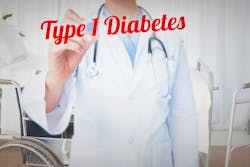On Sept. 1, the nonprofit Blue Circle Health will partner with up to 15 Federally Qualified Health Centers across the state of Florida to launch diabetes support coaching services while it continues to build a team and infrastructure to offer more support and care focused on Type 1 Diabetes (T1D).
In a recent blog post, Leonard D’Avolio, Ph.D., Blue Circle’s CEO, described how in the fall of 2021, a group of T1D experts was gathered by the Leona M. and Harry B. Helmsley Charitable Trust for a two-day meeting to begin answering the question: If we could create a healthcare delivery system for people with T1D – unconstrained by tradition or reimbursement concerns – what would it look like? In other words, how exactly should T1D care be designed? It was the first meeting for what would become Blue Circle Health, a healthcare delivery system for people with T1D living in under-resourced communities. It is funded by the Helmsley Charitable Trust.
D’Avolio said the organization’s goal is to build a St. Jude’s-like program specifically for T1D that cares for patients regardless of their ability to pay. But he added that how exactly to do that – what services to offer, where, when, and to whom – introduces an enormous number of decisions, each one of which carries consequences.
He explained the decision to partner with FQHCs by mentioning that they typically focus on primary care but do not have T1D specialists on staff. “Working with FQHCs will allow us to connect to the people we hope to serve while also ensuring that they have access to critically important primary care,” he said.
D’Avolio also noted that to become a model, one needs to be able to demonstrate not just improved outcomes but the ability to do so cost efficiently. “Of all of the things we will measure, the ratio of improved outcomes to the cost of achieving improvement is among the most important,” he wrote.
Blue Circle Health stresses that an important foundation for trust is a single, accessible point of contact. “For this reason, our care model centers on trained diabetes support coaches. The coach serves as the primary point of contact – the guide for those we serve throughout their journey. They can be accessed when they’re needed in whatever modality makes the most sense for the individual with T1D,” D’Avolio wrote.
“It’s a model learned from the ECHO Diabetes program led by Drs. Michael Haller, Ashby Walker, David Maahs and others and also informed by Dr. Michael Harris of OHSU and his NICHE program. Both proved the importance of a trained peer as a friend, mentor, and guide for supporting people with chronic conditions.”
In fact, he added, the first wave of coaches will be transitioned from the Diabetes ECHO program at the University of Florida as that research project draws to a conclusion. Each of the coaches hired are from the same communities as the people Blue Circle serves, speaks the same language, and lives with T1D.
D’Avolio said care would escalate from coaches to members of a multidisciplinary team that includes nurses, advanced practice nurses, registered dietitians, pharmacists, insurance navigators, behavioral health specialists, social workers, and endocrinologists with experience supporting people with T1D. In addition, connections will be made with ancillary providers through the patient’s primary care group to include podiatrists, optometrists and ophthalmologists, nephrologists, cardiologists, ob/gyns and others.
He also said one of the top priorities is to build an infrastructure that allows Blue Circle to gather data and learn without placing undue burden on the care team or patients. “Progress to date includes access to feeds of continuous glucose monitor data from several manufacturers and validated predictive models able to anticipate dangerous situations before they become acute (e.g., rising A1c and diabetic ketoacidosis),” he noted. “However, there is much work to be done as today’s electronic health records are designed more for billing than for learning, and few useful population health tools for people with T1D exist.”
The organization’s chief medical officer is Anne Peters, M.D., professor of medicine at the Keck School of Medicine of University of Southern California and director of the USC Clinical Diabetes Programs. Her research has focused on testing new approaches for diagnosing and treating diabetes and developing systems of care to improve outcomes in diabetic populations.
Prior to Blue Circle, D’Avolio was the co-founder of Cyft, a company dedicated to helping serious illness care providers succeed in value-based care. He is also an assistant professor at Brigham and Women’s Hospital and Harvard Medical School. He is an advisor to several healthcare startups. Prior to founding Cyft, he led informatics at Ariadne Labs where he helped improve childbirth across 70 clinics in India. Prior to that he created the infrastructure for the world’s largest genomic medicine cohort and embedded the first clinical trial within an electronic medical record system for the Department of Veterans Affairs.


